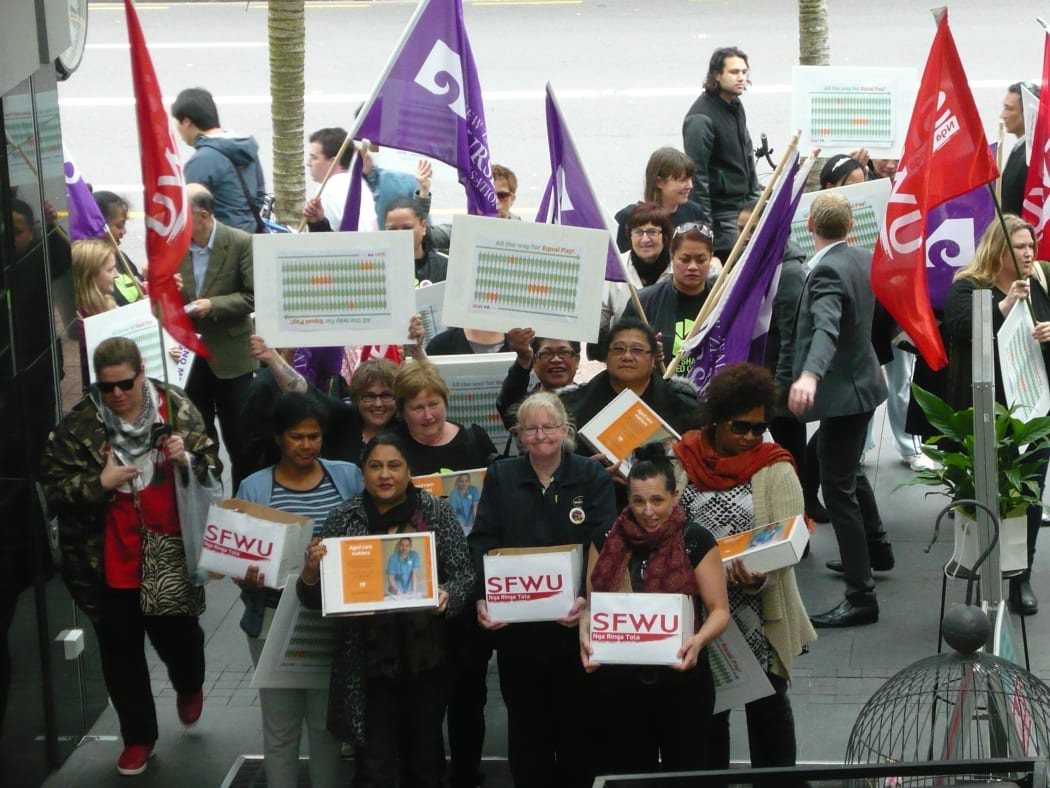Rest home providers will decide during the next few days whether to appeal a ruling in a landmark case based on whether the low pay of women in the sector was discriminatory.
The Court of Appeal has dismissed an appeal by aged care providers in the case, which centred on a claim by Lower Hutt rest home worker Kristine Bartlett that women care workers' low pay was discriminatory.

Aged care workers and Service and Food Workers Union members presenting a petition to the Employment Relations Authority in Auckland in September, before handing in claims of low pay. Photo: RNZ / Lauren Baker
The Employment Court backed Ms Bartlett's claim, sparking the appeal by her employer, Terranova Homes, and other providers.
The Appeal Court ruling today said it was a difficult case to decide, with strong arguments on both sides.
The ruling said the court's decision to dismiss the appeal was driven by the language and purpose of the Employment Equity Act.
Aged Care Association chief executive officer Martin Taylor said the ruling was disappointing and there would be an urgent meeting with the Government in the next few days to address pay increases within the sector.
The industry would also consider whether to appeal the decision.
Mr Taylor told Checkpoint the ruling could have catastrophic consequences for the sector if businesses were forced to pay workers a significant increase.
Improving low pay rates in aged residential care would cost between $120 and $140 million a year - money which would have to come from the Government, which had in 2005 given a 20 percent rise to similar workers employed by district health boards.
"Well back in the day, we actually asked the Government to increase our funding so we could, and back in the day the Government said 'no' and every day since the Government has been saying 'no'," Mr Taylor said.
"We're always disappointed about losing the appeal but we certainly understand why the union took the case. There's an injustice here, and it's been injustice that's been around for decades.
"The injustice has been cause by ... prolonged government underfunding. That's the real story here."
Homes could have to close if the Government did not increase funding, Mr Taylor said.
Ms Bartlett said she was "ecstatic" at the decision, which she said confirmed her view the work she and her mostly female colleagues do was undervalued.
She had had few pay rises in her 22 years as a carer and was working just above minimum wage, she said.
"Just been disgusting, really, for what we do do. So it's something I always wanted, I was hoping I could achieve something before I retire."
Ms Bartlett wanted her employer to abandon any possible appeal against today's ruling. The next step was to find an equivalent type of job outside the sector for aged care workers' wages to be compared with, she said.
Public Service Association (PSA) national secretary Erin Polaczuk said the decision brought New Zealand a step closer to genuine pay equity for women.
Ms Bartlett's case would have an impact on other industries which predominantly employed women, she said.
Service and Food Workers' Union national secretary John Ryall said the ruling vindicated its belief aged care workers faced pay discrimination, and Terranova should accept the ruling.
"We're asking them to abandon future appeals and to get around the table with the unions in the sector and to work out a pathway forward to deliver a living wage for workers employed."
The ruling had implications for other female-dominated industries, such as cleaning and home care, Mr Ryall said.
Labour Party women's affairs spokesperson Sue Moroney said the court decision had wide-reaching ramifications.
"Now the court will get to determine what a fair wage is for people working in rest homes, whether they be male or female, and that then has implications for a whole range of other female-dominated workforces as well," Ms Moroney said.
In September, about 2500 claims of low pay based on gender discrimination were formally handed to the Employment Relations Authority, following Ms Bartlett's case.



